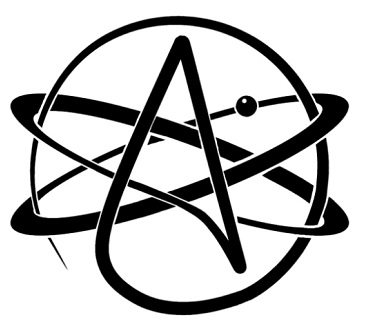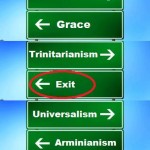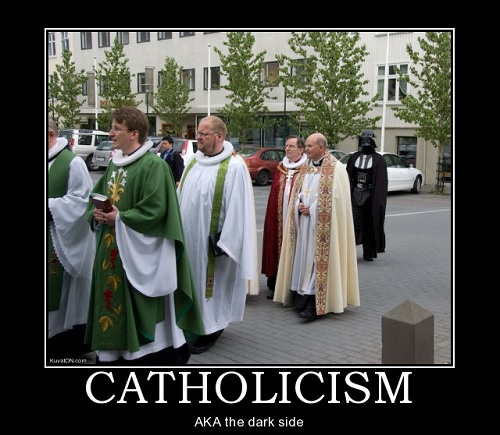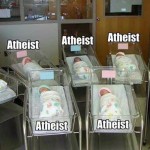
On How I Became an Atheist: A Coming Out Letter
Story submitted by Jaco van der Byl
Since writing my coming out letter to my parents, my father has identified as an atheist, as well as my brother. Neither was as a result of the letter. Instead, we had all come to this conclusion independently. My mother and sister remain Christian. It has been tough on them, particularly my mother. My sister has been silent on the matter… But I have not been rejected, I am happy to say. We still have a good relationship, despite the occasional noises of horror and disappointment when I’m vocal and unrepentant about my atheism and my dislike of religion on Facebook.Â
Dear Mom and Dad,
I’ve given you some shockers over the years—I feel quite guilty about that, I promise!—but I am proud that I’ve been truthful with you about my life choices, in the end, at least. It’s important to me to be transparent; it doesn’t sit well to be otherwise.
Another admission is pending, I’m afraid. This time, I confess, I had resolved to stay quiet, not because I am ashamed, or because it’s easier not having this conversation, but rather, I had reasoned that this particular revelation would cause you undue distress and hurt. But I changed my mind. This letter, I’m sure, will distress you, of that I have no doubt, but it dawned on me that you already know—or suspect—in part, what I’m about to tell you. Nothing gets past you Mum! I trust that you’ve already dealt with some of the distress and fear, and so, to try to “save†you pain, is, in fact, the cowardly way out. I’m sorry if this hurts, but it’s better to be open and truthful about the “whatâ€, and offer you the “whyâ€â€¦
I am an atheist. To be specific, I am an agnostic atheist, and that simply means that I do not know for certain that there is not a God, but I don’t believe there is.
I live my life as if there isn’t a God, in much the same way, as I live my life as if there isn’t a Santa Clause. I don’t know for certain that there isn’t a Santa, but I don’t believe that there is. This is a silly and contrived comparison, perhaps, but it does illustrate an important point: not knowing for certain if a claim is true, does not necessarily mean that the rejection—disbelief—of the claim is made in, or leads to, doubt. God can’t be disproved, and I recognise that to profess certain knowledge that no Gods exist is an untenable and arrogant position. I am, however, rationally convinced that God, especially a personal one, is overwhelmingly unlikely, and I simply do not believe the claims that God is real, because the evidence is poor, contradictory, and unconvincing.
For clarity, I’d like to say a little bit more about atheism by quoting Sam Harris:
In fact, ‘atheism’ is a term that should not even exist. No one ever needs to identify himself as a ‘non-astrologer’ or a ‘non-alchemist.’ We do not have words for people who doubt that Elvis is still alive or that aliens have traversed the galaxy only to molest ranchers and their cattle. Atheism is nothing more than the noises reasonable people make in the presence of unjustified religious beliefs
Atheism is less about saying there isn’t a God, and more about rejecting claims of Gods. So many cultures believe in Gods. If one stands back, and objectively review the situation—knowing what we know about our reality today—it is easy to dismiss these numerous claims as man-made. In fact, Christians are atheists with respect to all other faiths. They reject the claims of Islam, Catholicism, Judaism, Mormonism, Scientology, not to mention all the African, American, Eastern superstitions. Likewise, other religions do the same. Atheists merely go one God further.
That said, how did I get to this point? Not suddenly, I can say. It took me about six years away from the church before I consolidated my belief, or rather, my disbelief. It was a gradual process. For the majority of that time, I didn’t think about religion or God; I just suppressed it, when it threatened to come up, and enjoyed life away from the church. Why do I say enjoy? Well, that is really the crux of the story. In short, Christianity made me profoundly unhappy.
You will remember my dramatic conversion the night that Elizabeth and I stood in front of you in tears. I wrote about this experience and how I became a Christian in my blog post, Part I: On How I Became a Christian. It relates to my eventual disillusionment with Christianity, but I must offer a caution: that post is a much tougher read than this letter, and it contains things that you will find hard to swallow. I’d like you to read it, but know that it will be a shock. Anyway, after repenting and accepting Jesus into my heart, I was a typical fired-up, born-again Christian. I had found a plaster for the past’s guilt, shame and fear; I didn’t realise it was a plaster, at the time; to me it was a cure. I took my relationship with God seriously… I was sincere.
Comparing my Christian life to bi-polar disorder seems apt, somehow. There were high moments—mostly in a congregation—but these were consistently followed with moments of darkness. For years, I struggled with my “sinful†nature—primarily sexual desires, but other things too. I did all the things that you might expect. I prayed. I trusted God. I sought counselling. I accepted that I was a wretched, broken sinner, with no hope of meeting God’s law through my own efforts; I knew that I could overcome only through the grace of God. I turned from sin, and I trusted Jesus. But, you know, there was never a change in my desire to sin. I would fall and repent, fall and repent, fall and repeat. Each time, I hated myself just that little bit more. No matter how sincerely I prayed and begged, I could not overcome. It was not unlike an abusive relationship. It wore me down. The cure was supposed to remove my guilt, shame and fear, but instead the “cure†fed it. It is one of the great ironies of religion.
I can list other things that bothered me, like the church leaders that kept falling to scandal, and speaking in tongues, which I knew in my heart I was faking. I wondered for example, why healing prayers, even small ones, were not answered? By the way, why does God never heal amputees? It concerned me that so many other Christians were horrible and unreliable people… So many things didn’t seem right, but none of these made me leave the church. I brushed these questions aside as one is encouraged to do—God works in mysterious ways, and all that. Who are we to judge and question? Well, considering the stakes, and considering what is expected, is it not vital that we question? If it is all true, should the faith not stand to up to scrutiny? But it doesn’t, and that is why questions are not encouraged, or worse, questions are answered with superstition and pseudo-science.
I wish I could say that other things convinced me, such as the inconstancies in the bible, or science—that has more compelling answers for everything that religion tried to explain. I wish I could say that an intellectual argument compelled me to change my mind. But it did not. When it boils down to it, I left the church because I was weary, and so, so, so unhappy. That point being made, I think I’ll move on.
What happened when I left the church? Well, my life improved. Sure, I still harboured guilt and fear, but I ignored it. And in time, these feelings faded, almost forgotten. I embraced my nature and made peace with the fact that I am human. There was no-one to impress, no-one watching over my shoulder. And it felt good. I got down to living life. In hindsight, I know that leaving the church was essential for my happiness. I am now a husband and father as a direct result of that decision.
The next big change happened only recently, when I discovered the late Christopher Hitchens. He challenged me to start thinking about the important questions in life again. How did we come to be? Why are we here? What is it to live a moral life? Why are we like we are? He encouraged me to pursue knowledge and wisdom. I discovered that science and philosophy and literature have better, and more wondrous, answers than religion. I finally overcame the indoctrination of my faithful years. I was so far removed at this point that I could analyse Christianity objectively. My guilt, shame and fear have truly been discarded, and my lust for life invigorated. We are incredibly fortunate to have our time in the sun. It is precious and wondrous—all the more because it is the only time that we are likely to get.
I don’t deny the power of religion. I obviously experienced this in my own life. The truth is that a lot of very smart people are religious. Intelligent individuals are perhaps the most adept at rationalising unreasonable beliefs. We have an evolved nature to believe in a higher power. We are “programmedâ€Â to see design and purpose. Also, we should not discount culture. Children raised in a certain faith are almost guaranteed to stay in said faith. Childhood indoctrination is tough to shake.
It is also true that a lot of people have transcendent experiences, and this makes religion very compelling. As Christians, we’ve all believed that prayer works; we’ve all experienced peace and happiness in God’s presence. This cannot just be imaginings, our minds running amok, or coincidences, can it? It can’t just be psychological? Well actually, it can be, and it probably is a function of our brain. Science offers answers to these phenomenon. These experiences are always subjective, and they have never been objectively demonstrated to be of supernatural origin. They are emotions that has been demonstrated to be functions of the brain. When I was a Christian, I knew that I knew, that I knew, that it was all true. Now, I know that I know, that I know, that it is not. The difference is that my conviction is now supported by something more than just feelings, and that is important, because we know that humans are too easily fooled.
I don’t want to offend you, but I’m sure that I must have. I know that you find great comfort and strength from your faith, and that is absolutely fine. I don’t respect Christianity, but I respect your right to believe it. I don’t write this to convince you that I’m right. Instead, I want to offer you some explanation as to why I am a disbeliever. I wish that I could spare you the grief of your belief that I will go to hell because I have turned from God, but that is not in my power. All I can say is that I’m finally free from that fear.
In conclusion, I want to say that I am very grateful for you. You are the very best parents one could hope for. I love and respect you dearly. I would not have sent this if I did not.
Lastly, my hope is that this would open a channel of conversation rather than close it. If you have any questions or comments, please email or phone me. I have trimmed out a lot of things that I wanted to say; it was not really relevant, and I didn’t want to sound too preachy. I’m not convinced I succeeded at that. I am very passionate about the things I have learned, and I would love to talk, debate, and share.
Your loving son
The original story can be read here:Â
https://amrestorative.wordpress.com/2013/04/07/part-ii-on-how-i-became-an-atheist/







